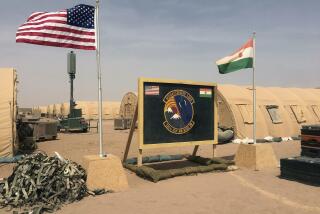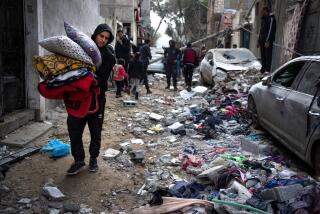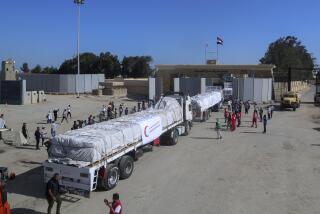In Zaire, Remember Somalia
- Share via
The lessons of American losses in Somalia inform the multinational rescue mission being mounted to try to save up to 1 million refugees facing starvation, disease and violence in eastern Zaire. President Clinton is willing to commit U.S. troops to perform a mercy airlift no other country could conduct, but only if the warring parties who created this disaster agree to a cease-fire and the African countries in the region support the mission. Compliance with these terms would reduce the danger in this urgent endeavor.
The U.S. troops could begin deployment this weekend if the conditions are met, which seems unlikely that soon. The first 1,000 soldiers would secure the airport at the Zairian town of Goma. Others might join units from a Canadian-led, 12,000-member multinational U.N. force seeking to establish corridors for passage of humanitarian supplies to the rough, open camps of the refugees. Most of the Americans, perhaps 2,000 to 5,000 more, would be based in neighboring countries, close enough to provide support if required.
The recent fighting stems from the genocidal 1994 attack by Rwanda’s Hutu majority on the Tutsi people. Subsequently, Tutsis gained control in both Rwanda and neighboring Burundi, sending a flood of Hutus into Zaire and destabilizing that country’s eastern border and its weak regime. The current conflict involves factions of all three countries.
This is not an American fight. Members of the U.N. force should refuse to choose sides, and the cease-fire is a prerequisite. But American officials concede that the leaders of armed militia forces, some of whom are mixed among the Hutu refugees, are not known. U.S. troops have been given what are called “robust rules of engagement,” meaning they can shoot anyone who tries to get in their way.
From the day of deployment, whenever it comes, there will be a deadline on goodwill demanded for the U.N. forces. Some Clinton administration officials say they anticipate a four-month operation to provide humanitarian care to the refugees. The chance of that much time passing without violence is small. So the Somalia lesson is commended. The U.N. force is going to eastern Zaire to save lives, not take them or lose them. If the commitment goes further, as it did in Somalia, then this will have been a very bad idea, whatever the humanitarian compulsion.
More to Read
Sign up for Essential California
The most important California stories and recommendations in your inbox every morning.
You may occasionally receive promotional content from the Los Angeles Times.










